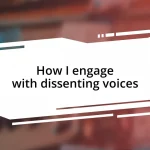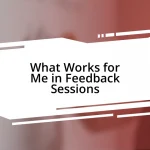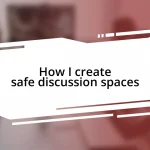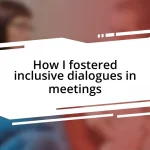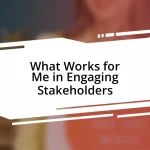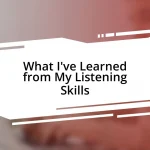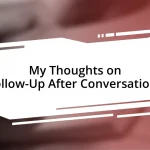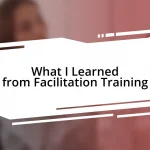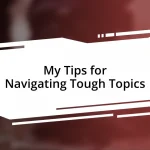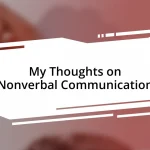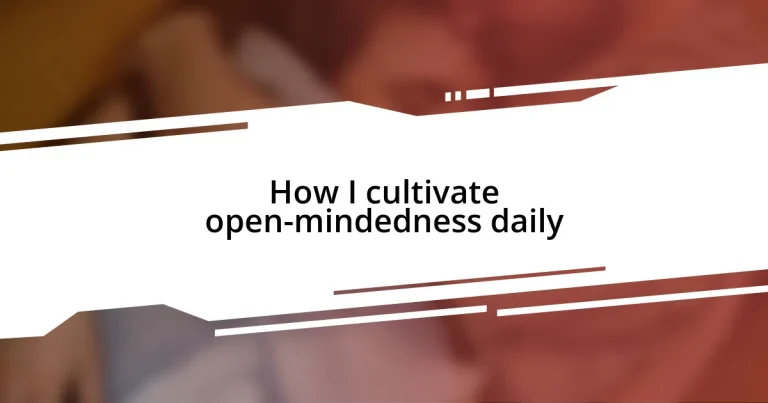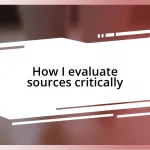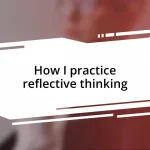Key takeaways:
- Open-mindedness enhances understanding, creativity, and resilience by encouraging the exploration of diverse perspectives.
- Daily practices, such as active listening, journaling, and engaging with different viewpoints, can cultivate a more open mindset.
- Reflecting on personal biases and seeking new experiences promote deeper connections and broaden one’s worldview.
- Evaluating one’s progress in open-mindedness through emotional responses and intentional conversations fosters personal growth and empathy.
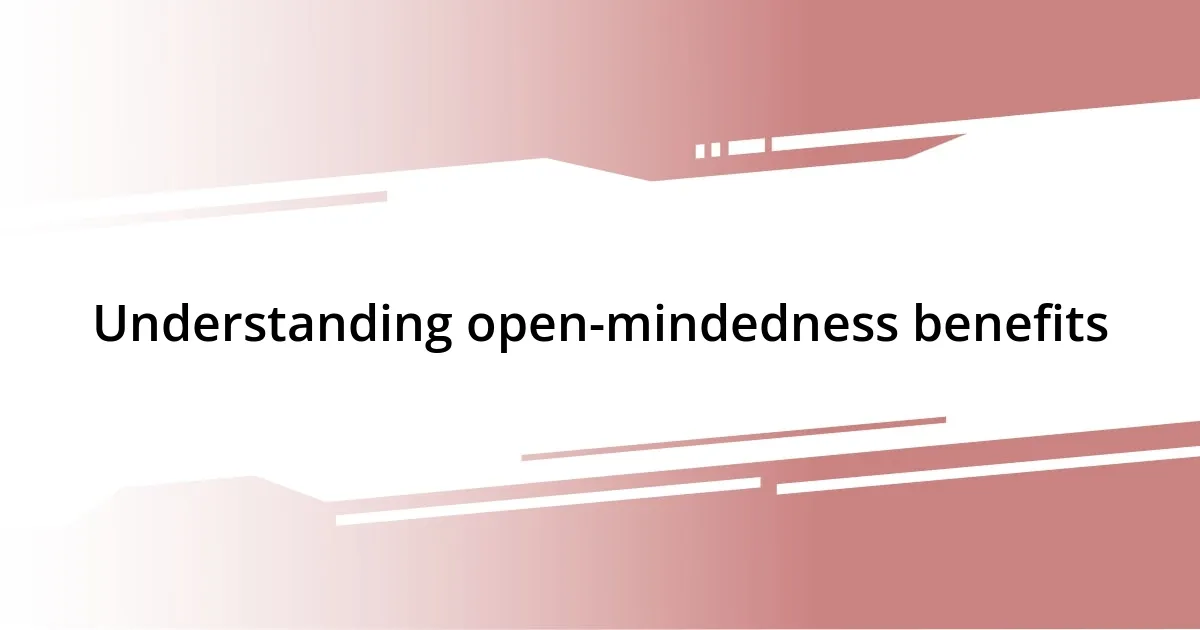
Understanding open-mindedness benefits
Open-mindedness opens doors to understanding and compassion. I still remember a time when I engaged in a heated debate with a friend about a controversial topic. Instead of sticking to my views, I listened—really listened—to their perspective. This experience not only deepened our friendship but also enriched my understanding of the issue. Isn’t it fascinating how being willing to consider different viewpoints can transform relationships?
The benefits of open-mindedness extend beyond personal interactions—it’s about growth too. I often find that when I embrace new ideas, I unlock creative potential I didn’t know I possessed. Have you ever tried approaching a problem from a different angle? It’s amazing how just a little flexibility in thinking can lead to innovative solutions and fresh insights.
Moreover, open-mindedness fosters resilience. Life throws curveballs, and viewing challenges through a flexible lens helps me navigate them better. I recall a tough career transition where being open-minded allowed me to explore paths I hadn’t considered before. How has your ability to adapt in the face of uncertainty shaped your journey? When we can shift our mindset, we create space for new opportunities to flourish.
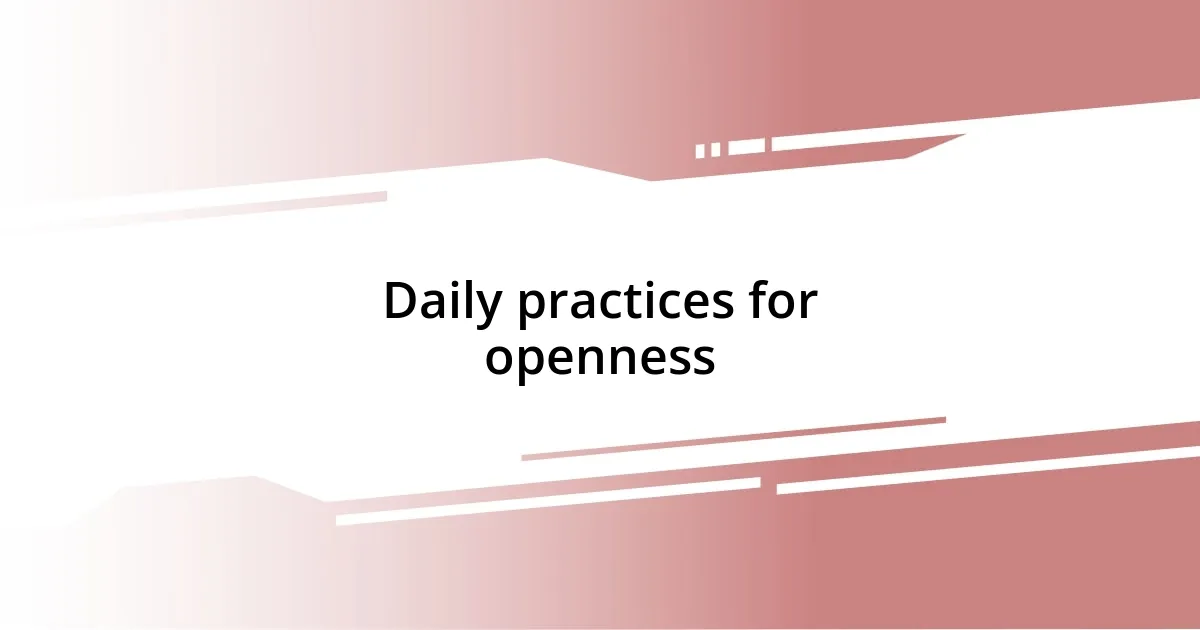
Daily practices for openness
To cultivate openness daily, I’ve found it beneficial to embrace diverse experiences. For instance, I try to engage with content that challenges my views—whether it’s a book that offers a contrasting perspective or a podcast featuring guests from different backgrounds. This approach has not only expanded my understanding but has also encouraged me to reflect on my beliefs in new ways. It’s rewarding to break free from my echo chamber, even if it feels uncomfortable initially.
Here are some daily practices that enhance open-mindedness:
- Daily Listening: Spend time actively listening to someone with a different viewpoint each day.
- Journaling: Write down new ideas and reflect on how they make you feel; examine those feelings.
- Explore New Topics: Dedicate 15 minutes a day to read or watch something outside your usual interests.
- Mindful Conversations: Approach discussions with curiosity, asking open-ended questions to understand rather than to debate.
- Challenge Yourself: Try something you’ve never done before each week, whether it’s a new cuisine or a different exercise routine.
These small yet impactful changes keep my perspective fresh and my mind flexible. I’ve noticed that even a simple conversation with a stranger can spark thoughts I never would have considered otherwise.
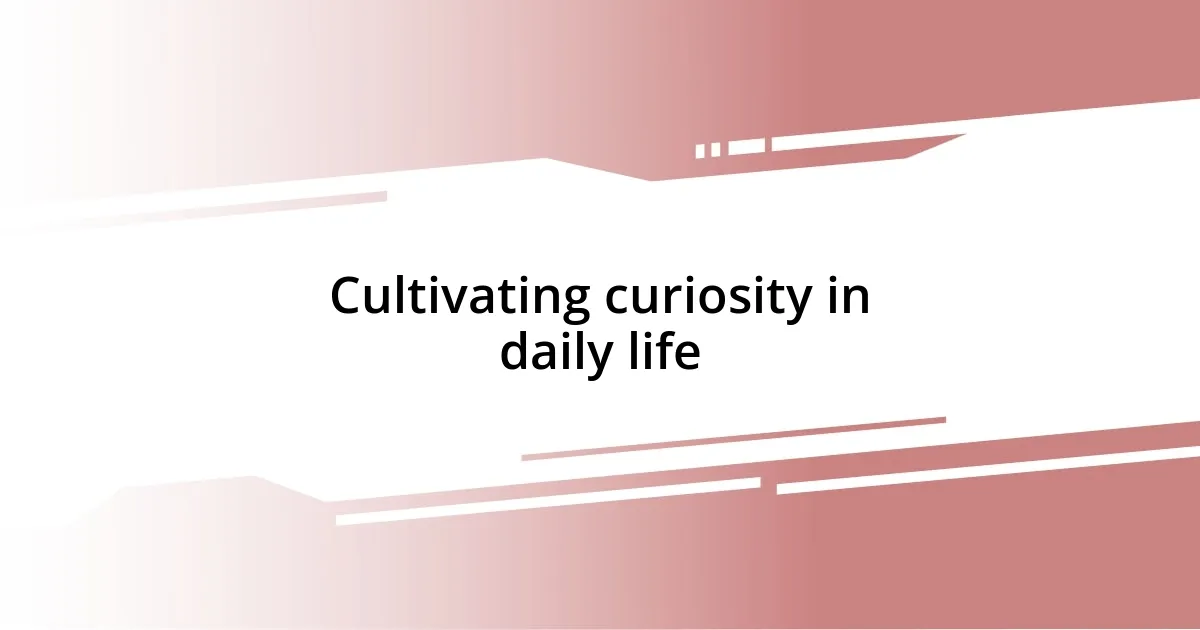
Cultivating curiosity in daily life
Cultivating curiosity in daily life can be an exhilarating experience. I often wake up with a simple commitment: to learn at least one new thing each day. For instance, just yesterday, I set aside time to watch a documentary on a culture I knew little about. As I absorbed the stories and perspectives, I felt a sense of connection wash over me; it was as if each nugget of knowledge opened a tiny door inside me, expanding my worldview. Have you ever felt that rush of excitement when you discover something unexpected?
I’ve also found that integrating curiosity into everyday tasks can shift my perspective entirely. On my commute to work, I intentionally look for something new—maybe it’s a unique architectural detail on an old building or a street performer showcasing their talent. I recall one morning when I stumbled upon a small art installation that momentarily stopped me in my tracks. That brief encounter turned an ordinary commute into a moment of inspiration, prompting me to think creatively throughout my day. How often do we let life’s routine moments slip by without acknowledging their potential for wonder?
Lastly, my interactions with people deeply fuel my curiosity. I make a point to engage with colleagues or strangers by asking them about their experiences or opinions. Recently, I asked a fellow bus passenger about their favorite childhood memory, which led to a heartfelt exchange about our upbringings. The stories shared not only made my day but also reminded me of the beauty in each person’s unique journey. What stories have you uncovered lately that inspired you?
| Curiosity Practice | Example |
|---|---|
| Learning Something New | Watching an informative documentary or reading an article on an unfamiliar subject |
| Finding Inspiration in Routine | Noticing a unique detail during your daily commute |
| Engaging with Others | Asking open-ended questions to learn about others’ experiences |
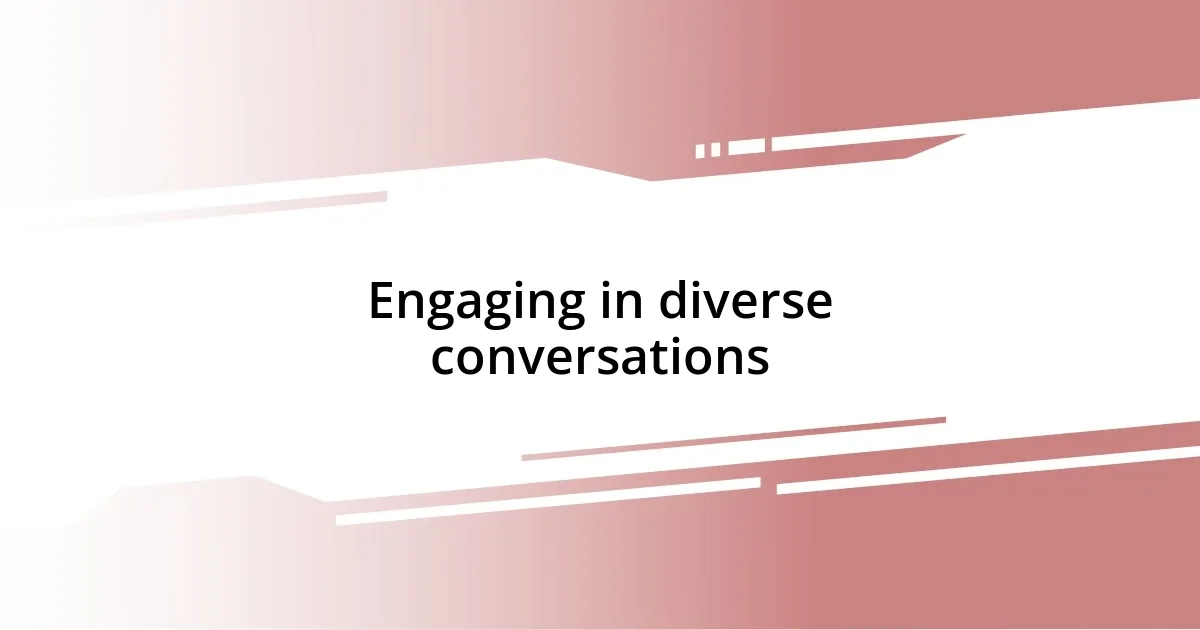
Engaging in diverse conversations
Engaging in diverse conversations is a practice I cherish deeply. I remember a day at the local coffee shop when I struck up a conversation with an artist from a completely different cultural background. As we talked about our motivations and life experiences, I felt a surge of inspiration, realizing how much I had previously taken my own perspective for granted. Have you ever encountered someone whose story challenged your understanding of the world? It’s moments like these that remind me of the power of shared dialogue.
When I seek out conversations with people who hold different beliefs, I often prepare myself to listen more than I speak. Once, while volunteering at a community center, I had the chance to engage with a group discussing their views on social issues. Instead of jumping in with my opinions, I focused on asking questions that encouraged them to share their thoughts. This experience challenged me to step outside my comfort zone and truly appreciate the nuances of their perspectives. It made me wonder: how often do we rush to express our opinions without fully understanding the views of others?
I also find that being open to diverse conversations can happen in unexpected places. For instance, during a public speaking event, I had the opportunity to connect with attendees from various fields. One conversation with a scientist about their research on climate change shifted my perspective dramatically. Hearing their passionate concerns made me rethink my own actions. It’s moments like these that ignite a desire to dive deeper into topics I might have previously overlooked. So, when was the last time a conversation reshaped your viewpoint? Embracing these dialogues can truly open our minds in ways we never imagined.
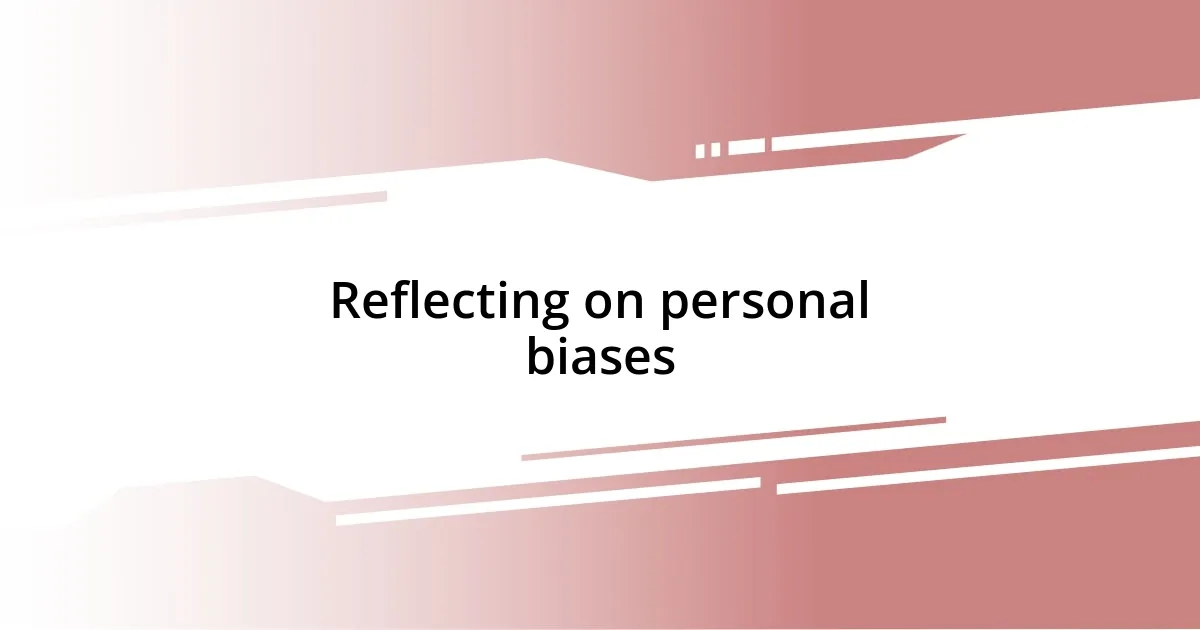
Reflecting on personal biases
Reflecting on personal biases is a crucial step toward cultivating open-mindedness. I often catch myself unconsciously favoring certain viewpoints, which can limit my understanding of the world. For example, I vividly recall a moment during a group discussion where I realized I had dismissed opposing opinions simply because they didn’t align with my own. This awareness hit me hard—could it be that I was curating my experiences to fit a narrow narrative?
To combat this tendency, I make it a habit to pause and dissect my thoughts regularly. I ask myself challenging questions: “Why do I feel this way?” or “What experiences shaped this belief?” This practice often unveils layers of my thinking that I hadn’t considered. A while back, during a family gathering, I found myself disagreeing with a relative regarding a contentious issue. Instead of arguing, I instead chose to listen deeply to their perspective. By the end of our conversation, I grasped not just their viewpoint but also the emotions driving it. Reflecting on my biases allowed me to connect, rather than clash.
I also keep a journal where I jot down moments that reveal my biases. It’s surprising how many times I’ve reacted based on preconceived notions rather than facts. One entry stands out: I had initially judged a colleague based on their appearance, only to discover through collaborating with them that they had invaluable insights to share. That experience opened my eyes to the prejudice I unknowingly carried. How many times do we let our biases blind us to potential friendships or partnerships? This reflection reminds me that acknowledging our biases is not just about self-improvement; it’s about enriching our interactions and fostering a genuinely inclusive mindset.
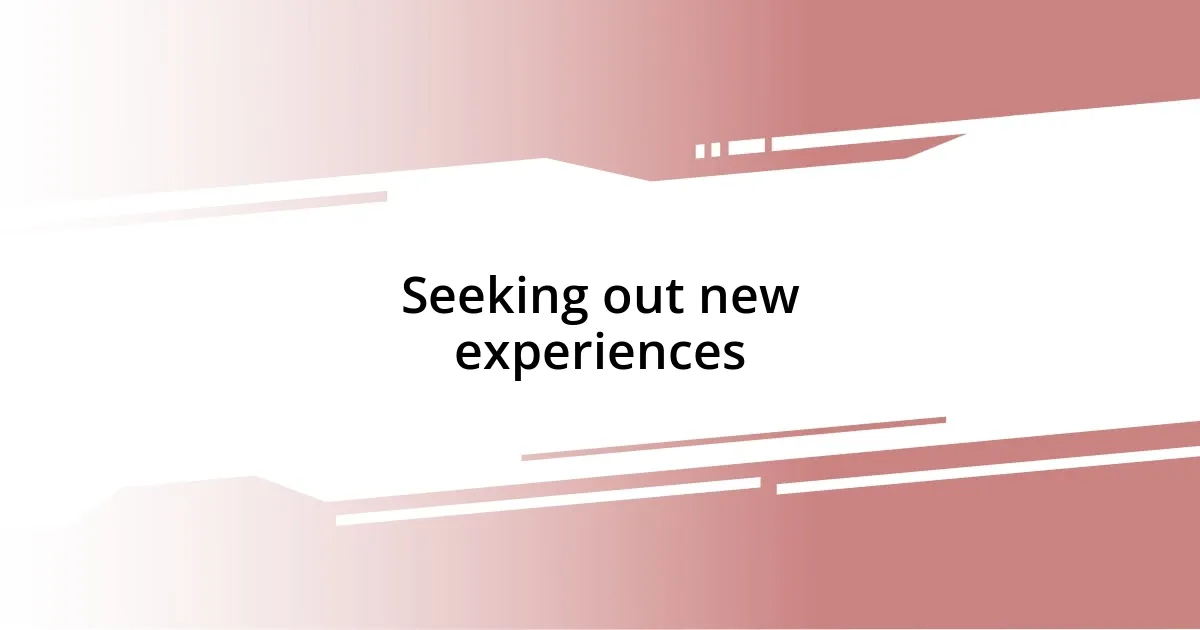
Seeking out new experiences
Seeking out new experiences has truly transformed my perspective on life. I remember the time I decided to take a cooking class focused on cuisines from around the world. Cooking alongside individuals from different backgrounds, each with their unique stories and culinary secrets, was exhilarating. Who knew that a shared passion for food could lead to such rich exchanges of culture and tradition? I found myself challenged not just to learn a new recipe but to appreciate the history and art behind each dish.
There have been moments when simply stepping out of my regular routine made a significant impact. One afternoon, I wandered into an art exhibit that featured local artists. I had no idea of their struggle to be recognized in a predominantly commercial art scene. As I listened to their stories, my mindset shifted. I began to understand the countless layers of effort that go into creating art that resonates with people. Isn’t it fascinating how a single event can broaden your understanding of creativity and the human experience?
Trying out new activities, like hiking in unfamiliar trails, has also opened my mind significantly. I remember a day spent in nature, surrounded by strangers who turned into friends through shared adventure. Climbing higher and exploring different paths, I encountered breathtaking views that made me reflect on my own journey. How often do we confine ourselves to the familiar? Each step off the beaten path reminds me that the world is full of beauty waiting to be discovered if only we’re willing to look beyond our comfort zones.
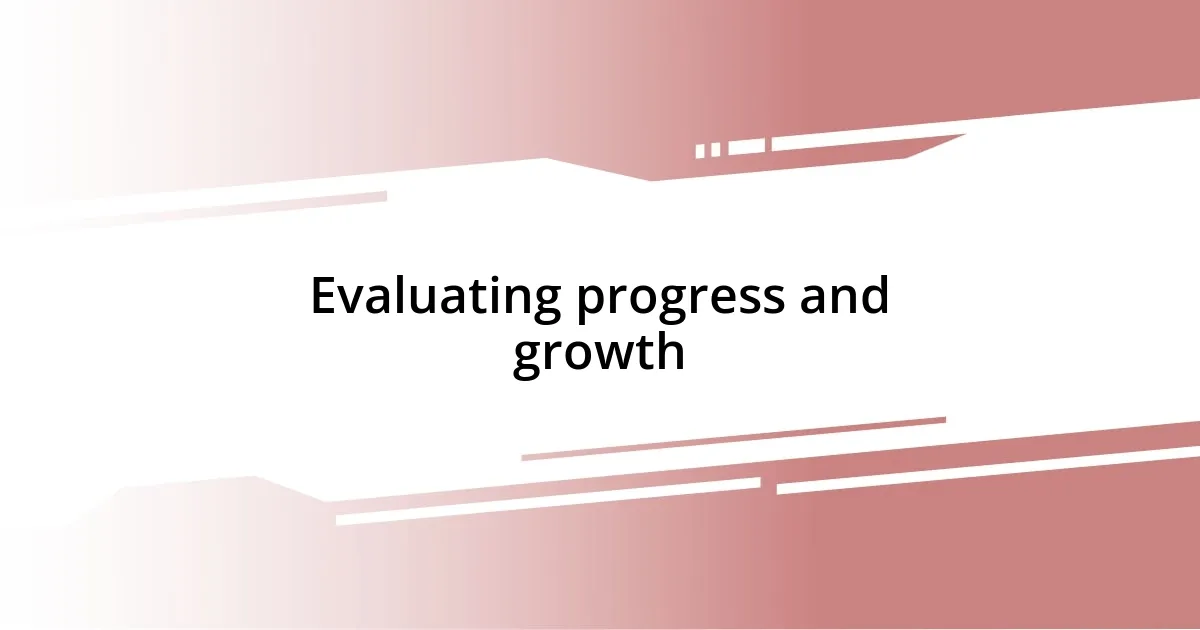
Evaluating progress and growth
Evaluating my progress in cultivating open-mindedness is something I find both challenging and rewarding. Occasionally, I take a moment to reflect on experiences that pushed my boundaries. I remember reading an article that contradicted everything I believed about a social issue I held dear. Instead of brushing it aside, I forced myself to engage with the author’s perspective, which required a level of vulnerability that felt uncomfortable. Was it enlightening? Absolutely. But it also meant confronting the very core of my beliefs. Isn’t that what real growth is about?
I also track my emotional responses to diverse interactions. One afternoon, during a roundtable discussion at work, a colleague presented an idea I initially dismissed. A wave of defensiveness washed over me, which was a telltale sign of my inner resistance. Afterward, I took a step back and analyzed that reaction. Why did I feel threatened? By honestly addressing my feelings, I recognized the importance of being open to alternative viewpoints, even those that challenge my professional stance. Reflecting on these instances allows me to see my growth clearly.
Another tool I use is setting specific open-mindedness goals, such as engaging with someone who holds differing opinions each week. I recall a coffee chat with a friend whose views on environmental issues starkly contrasted with mine. As we talked, I experienced a mix of frustration and fascination. It amazed me how our backgrounds influenced our perspectives. This process of intentionally stepping into someone else’s shoes helps me recognize not just my biases, but also my capacity for empathy. How often do we truly allow ourselves to experience the world through another’s eyes? It’s in those moments that I see just how far I’ve come—and how much further I can still go.
